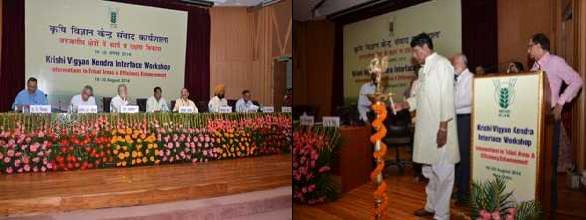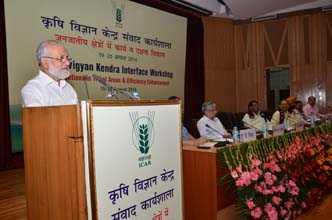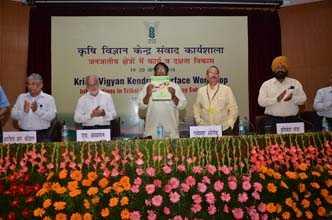Interface Workshop of KVKs Inaugurated
19th August, 2014, New Delhi
Dr. Rameshwar Oraon, Chairperson, National Commission for Scheduled Tribes inaugurated interface workshop of KVKs as Chief Guest here today. While appreciating KVKs for their worthy contributions for the welfare and development of the tribal community, he said a lot is still to be done for ensuring food security and sustained income generation. Despite serious efforts, tribal population is still lagging behind on various socio-economic parameters in comparison to general population, he said. Dr. Oraon emphasized that KVKs should take up challenge and responsibility for mainstreaming of the tribal people so that their development matches with the general population. Over the years, various government schemes have made a lot of promises, but the gap between promises and performance should be bridged up on priority basis, he added.
Dr. S. Ayyappan, Secretary, DARE and DG, ICAR highlighted the importance of the workshop which is being conducted on this theme for the first time. Tribal communities have rare germplasm and have also generated technical knowledge based on their decades of experience which can be utilized for further refinement and use. He suggested digitization of their knowledge particularly on herbal medicines, tubers and coarse cereals. ICAR is contemplating to develop model villages in tribal areas through interventions of KVKs and we are also committed for skill development which will lead to competence and confidence in the tribal community, he added.
Shri R. Vijay Kumar, Secretary, National Commission for Scheduled Tribes, emphasized that mainstreaming of tribal community should be taken up on priority basis and the concept of lab to land may be strengthened at ground level.
Shri Hrusikesh Panda, Secretary, Ministry of Tribal Affairs, underlined the need to improve nutritional status of the tribal population and Gram Panchayats should work in this direction proactively in collaboration with KVKs.
Dr. Gurbachan Singh, Chairman, ASRB shared his experiences of working in tribal areas and also elaborated on the lessons thus learnt for improving socio-economic condition of the tribal community.
Shri Arvind R. Kaushal, Additional Secretary, DARE and Secretary, ICAR emphasized on the need to have better coordination between ICAR and Ministry of Tribal Affairs and also highlighted the need for documentation of their innovations and tools.
Earlier, Dr. Alok K. Sikka, DDG, Agricultural Extension, ICAR welcomed the dignitaries and presented an overview on KVK interventions in tribal areas. While elaborating on KVK mandate he informed that out of 639 KVKs across the country 75 are in the areas where tribals make more than 50% of the population. He briefed on the various modules through which KVKs are working for the development of tribal community.
Dr. A.K. Vasisht, ADG, PIM, ICAR made a detailed presentation on the achievements of ICAR under Tribal Subplan Component across the country.
The two-day (19-20 August, 2014) workshop is being organized on the theme ‘Interventions in Tribal Areas and Enhancing Efficiency’ by the Agricultural Extension Division of the ICAR. Vice Chancellors of Agricultural Universities; Directors of ICAR Institutes; Senior officials of ICAR, Ministry of Tribal Affairs, National Commission for Scheduled Tribes and PPV&FRA; Directors of Extension of AUs; Zonal Project Coordinators; Project Coordinators; and officials of KVKs located in tribal areas are participating in the event.
Concurrently an exhibition is also organized to showcase various technologies and products developed by KVKs especially for tribal community.
Dr. A.K. Singh, ADG, Agricultural Extension, ICAR proposed the vote of thanks and also coordinated the programme.
(Source: Directorate of Knowledge Management in Agriculture, ICAR)


